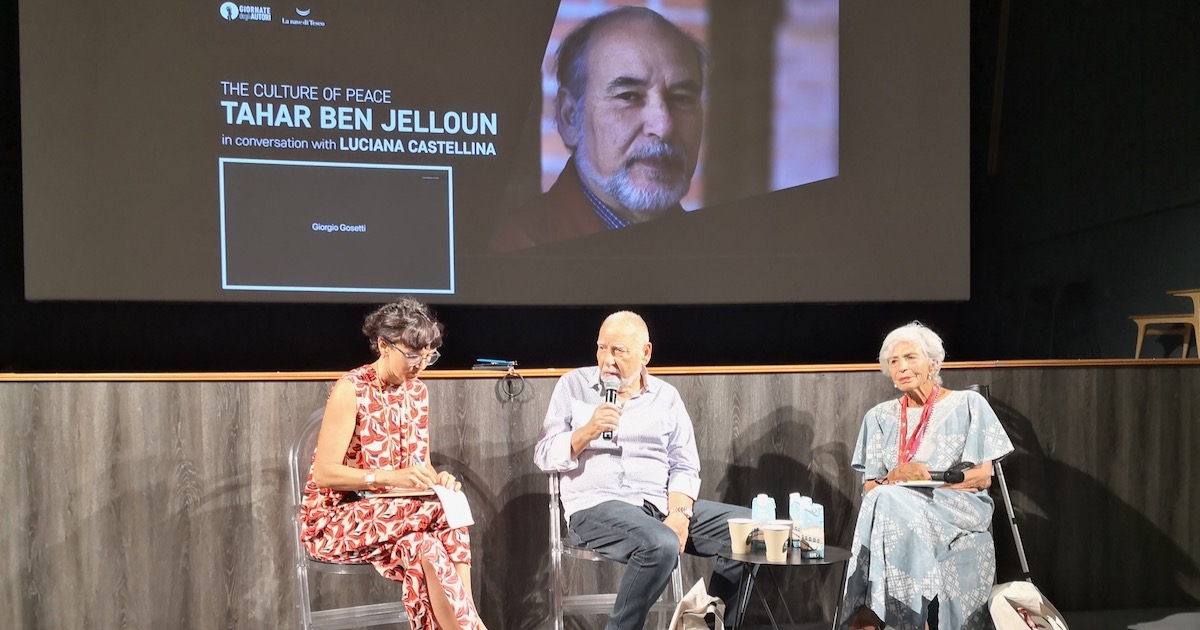Tahar Ben Jelloun and Luciana Castellina inaugurated Giornate’s new #confronti/Side by Side conversation series. They spoke about the Israeli-Palestinian conflict and the horror of a seemingly unending war, along with budding hopes in a new phase that will end the use of arms, with the intervention of cultural players
“There are people who have the duty not to remain silent in the face of what is happening globally at this time. In particular, the world of culture needs to intervene and take an active role in the resolution of conflicts.” With this exhortation, Giorgio Gosetti started off the first of twelve #confronti talks launched by Giornate degli Autori. Its debut event looked at the devastating wars shocking people everywhere, but not to the point of forcing them to create a viable peace movement. Is it time to challenge the strategies that the West is pursuing? Is a form of dissent with the power to trigger positive consequences still possible?
The Side by Side debate “Seeking peace” saw Tahar Ben Jelloun (also in Venice to serve as jury president of the Bookciak, Azione! competition) and politician Luciana Castellina facing off in a dialogue taking its cue from the Moroccan author’s recent book L’urlo, published by La nave di Teseo. As Ben Jelloun explained, “I started to write this book right after the horrific events that took place on October 7th, as a man utterly aghast at the terrible attack by Hamas. That was awful in itself, and I knew that Israel’s reaction would be a thousand times worse. A few days later, the bombs started falling on Gaza, striking the Palestinian population. That’s when I realized that I had to write something different, to explain that the barbarity of the first act has been followed by barbarities even greater, since these were the work not of a terrorist organization but a national army. There’s no proportion between the two.”
“I’d like to thank Giornate degli Autori,” Castellina declared, “for deciding to open the new talk series with a debate on what is happening in Gaza, the worst aspect of which is our unawareness of the risks we are running. Yes, we were very frightening in the beginning. Then, little by little, day by day, we became inured to the horror. It’s crucial, then, to reignite the world’s attention, even in places like film festivals.”
What can be done? And how can a radical shift in direction be achieved, away from the blind violence of the war and towards the resolution of a conflict and a new way of coexisting? During their talk, both Ben Jelloun and Castellina repeatedly asked these questions and more. And while the author’s words were tinged with a pessimism born of realism, the politician who has battled for human rights was not ready to raise the white flag.
“We need to turn the war into a dialogue,” Castellina continued, “because that’s what this is all about. We have to outgrow, and fast, that medieval stage of politics in which the ‘game’ is won in the military arena. At this point, we can no longer accept that the issues are to be resolved through the use of force. History has made a new start, one which allows for pacts with enemies. Yet all around, deals are only being made between friends. The transition is arduous, yet imperative.”
“I’ve spoken with both sides, Israelis and Palestinians,” Ben Jelloun replied. “I’ve even visited the schools of both populations. When I returned home, I felt hopeless, since all I had witnessed there was hatred. Children are brought up to learn to hate. If you look at it from this point of view, there really seems to be no way out. The current situation is explosive. We all feel helpless, as citizens, intellectuals, writers, and filmmakers. We just don’t know what else we can do. Weapons are stronger than we are. Today, I see no solution. There’s no end in sight to the killing; too much hatred has been accumulated. Perhaps, in a hundred years, the ashes will have cooled enough so that dialogue can begin.”
“I myself would like to succeed in speaking with a part of Israel,” Castellina concluded, trying to start down the narrow path of hope. “It isn’t working: war changes people and makes them less inclined to reflection. What I would most desire to do, however, is reopen a channel of communication with that portion of Israelis who have been sensitive to the Palestinian question.”


